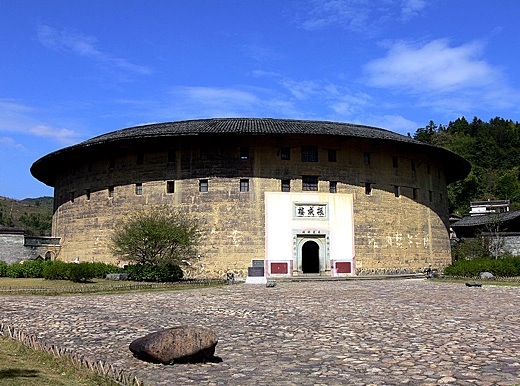 Image above: A rammed-earth Fujian Tolou residence of the Hakka people in Southwestern China.
From http://en.wikipedia.org/wiki/Fujian_Tulou.
Image above: A rammed-earth Fujian Tolou residence of the Hakka people in Southwestern China.
From http://en.wikipedia.org/wiki/Fujian_Tulou.
How do we fix it? This is a question I hear over and over again. People want to know what regulatory reform to take, what laws to pass, what criminals to prosecute, all in order to "fix" the system. Another variant to this question is "How do we undo the damage done so far?" Each of these questions assumes that the system continues as-is, that is to say, broken, or that the system gets fixed. In posing the question, the biases of the questioner are exposed. I'm not suggesting malicious intent on the part of those asking these questions, but rather culturally imparted ignorance of the alternatives.
Here is wisdom for those who would listen - as far as the system goes, the nation, the culture around you, do nothing! The unspoken alternative that cultural conditioning tries to eradicate from our thinking is collapse. When we say collapse too many ignorant yahoos think Mad Max. Collapse, as defined by Tainter is the unplanned move from a higher level of complexity to a lower level of complexity. Tainter does note that very rarely throughout history there have been a few voluntary moves from higher complexity to lower complexity. But the reality is that most of the time humans will not willingly choose to lower the complexity of their cultures. Thus the most common historical occurrence is collapse.
What does collapse mean in practical terms? For an example of a nearly fully collapsed state, look at Somalia. You can also look at Argentina and several other nations that are partly collapsed. As Tainter notes, when there is a large polity whose vested interest is in maintaining the status quo, the other states in the polity that have not yet experienced collapse will not allow a neighboring state to collapse completely. Yet as the limits of complexity along one path of development are reached, the neighboring states find themselves unable to restore a partially collapsed neighbor to its former glory either. Thus we enter the discussion of catabolic collapse, a stair step process over some period of time where states collapse to slightly lower levels of complexity, stabilize for a period, then repeat, all the way down until they reach a truly stable condition.
So we come back to the question of "How do we fix it?" The answer is that we do not fix it. It's not fixable. There are ecological and resource based reasons that collapse is occurring and will continue to occur globally. This process will press onward until industrial civilization as we know it is gone. The only hope for industrial civilization is a move to even higher levels of complexity but technology is being rude to us and not delivering the promised manna that will save us. Thus the move to a higher level of complexity is unlikely to occur. It's not impossible, of course, but right now it looks highly improbable.
There is something else to take to your friends when they ask the question "How do we fix it?" That something else is to educate them on the willful blindness inherent in that question. It's a bad question. The proper question would be "What are the possible outcomes of the current situation?" When you phrase it like that it's no longer broken-business-as-usual versus fixing the broken system. Suddenly the possibilities broaden and the possibilities include an unlikely move to higher complexity preserving the existing system, continuation of the existing system as-is, and either a planned or unplanned move to lower complexity. It is important to get past the cultural blinders that our society attempts to bolt to the sides of your head. Once you do that, you can begin to think "out of the box" and assess issues in terms that relate to true survival.
Note that I am not arguing that you do nothing. No, I am not arguing that at all. What I am arguing is that you do nothing to try to fix the global system. Let it fall. Your task, the one that the evolution of homo sapiens places squarely on your shoulders, is to take care of yourself and your loved ones as best you can. If you want ideas on how to start, I suggest getting out of debt, acquiring practical skills, and storing food and tools for the future.
If you are already at that point and want to think further, try studying the Afghan mud-and-straw Qalat or the Chinese rammed-earth Fujian Tulou. These are communal, defensible, high energy efficiency structures that can act as home, fortress, and workplace. My preference is the Fujian Tulous, but the qalat may be easier to build as society collapses around you. The lone ranch/farm idea will only go so far once we descend down the slopes of collapse. The structures mentioned above have been used for centuries to organize small communities and defend those communities as well.
Good luck! You're going to need it, especially when so many people are asking what you now know is the entirely wrong question.
No comments :
Post a Comment